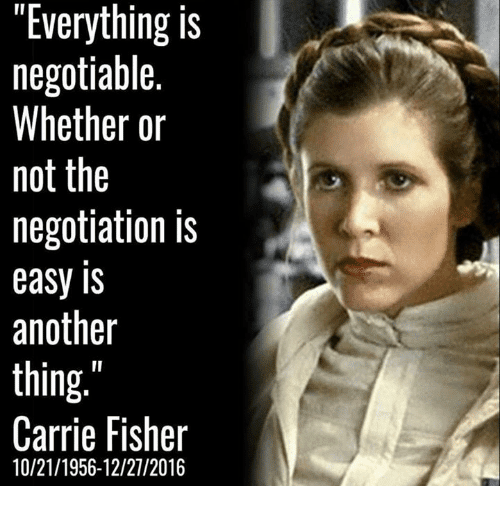
01 Sep The Power of Negotiation
You don’t get what you deserve, you get what you negotiate
Quote: ‘Everything is negotiable. Whether or not the negotiation is easy is another thing.’ – Carrie Fisher
1. Review
Information – and current information is crucial when heading into a negotiation.
If you’ve already got an agribusiness finance package, you need to continually review the current deal you have. Ongoing health checks of your business and finance needs could save a significant amount of money.
By reviewing your current situation, you can identify when it’s time to chat to your finance provider – or your broker – about renegotiating the deal you have.
In reviewing your current situation, you should also look at what your bank is offering new customers. Are there deals on offer that are better than yours? How does the interest rate compare?
And don’t just look at your existing finance provider. What are other banks offering? Just because they weren’t the right fit the first time around doesn’t mean they can’t help now. Your business has probably changed – and banks frequently change their criteria.
A recent experience with a client provides a good case study for why reviewing your situation is so important.
The client needed funds to implement the final stage of their succession plan. He wanted to buy land from a family member and dissolve a business partnership. As a lifelong client of his existing bank, he would normally just approach them assuming they’d provide him with the best rates.
Fortunately, his financial advisor suggested he test the market, so he engaged Robinson Sewell Partners to help him manage a tender process.
We prepared a credit submission and presented it to the market. It was an attractive proposition for the banks, which ensured strong competition. His current bank came back with rates 1% higher than the best offer received. This tested the client’s loyalty to his bank.
We presented two options.
We could negotiate with the existing bank to match the rates being offered by other banks. This was important, as the client valued the relationship with his bank.
The other option was organising the client to meet with a new bank to establish that the finance package and relationship proposition on offer met his business requirements.
In the end, we negotiated with his existing bank to match the deal offered by the other lender.
2. The Five Cs of Credit
There have been many changes to borrowing rules following the Banking Royal Commission. And we can expect the banks will continue to review and adjust their borrowing rules.
Despite these changes, the fundamentals of credit are still the same. We refer to these as the Five Cs.
Character, Capacity, Capital, Collateral, Conditions.
By reviewing your business, you’ll have a clear idea of where you stand on each of these criteria.
To negotiate a better deal, you need to know what your bank is looking at. These criteria give them a picture of where your business is at. If you’re in a strong position on each of these criteria, you could negotiate a better deal. And even if you have a weakness in one area, you might still have scope to negotiate if you can show your business has a strong position in the other 4 areas.
Working out where you stand on each of these criteria can be tough. And it can be even tougher to be objective. That’s where your advisors come in – whether it’s an accountant, financial advisor or a broker. Having someone outside your business objectively ‘score’ your business and help you prepare your negotiating pitch can be super worthwhile, not to mention saving you a huge amount of time.
Scenario:
A farmer is looking to buy more land to expand his livestock operation.
He has a small overdraft to help him with his cash flow management and a couple of small equipment finance loans. His business sits at 95% equity and has always been profitable. The livestock market is very strong and the sheep he runs are in high demand.
He has ticked off all 5 of the Five Cs.
The purchase of the new land changes his equity position to 80% with a Loan to Value Ratio (LVR) of 25%. The livestock market is still strong, and his character is the type a bank wants to deal with. But with the land purchase, his capacity to pay has come into question. The bank needs reassurance that he can repay the extra debt. To build up stock numbers, he needs capital investment to buy stock. Alternatively, he can breed his own stock. But then it would be 3 to 4 years before he’d be at full stocking capacity.
To give the bank comfort in lending the money, we prepared 4 years of livestock and cash flow budgets. This showed how they would build up the stock numbers and achieve a year-in/year-out income to service the debt.

3. Collate information
Quote: ‘Information is a negotiator’s greatest weapon.’ – Victor Kiam
Before you start negotiating a better deal on your finance, you need to make sure you have all your information together.
This includes:
- Tax Returns
- Financial Reports
- Statement of Position
- Bank Statements
- Budgets
- Production History
- Debt History
- Exit Strategy (primary & secondary)
- Background summary of business
- Succession Plan status
- Risk Management Strategy
If you don’t have all this information on hand, who can you talk to? Start with your advisors. This is where a broker can help you put all this information together.
It’s important to have all the information ready to go before you negotiate for several reasons. There may be a limited deal being offered by the bank. If you submit your application and it’s missing a piece of crucial information, the bank may not get back to you before the deal expires.
Having the correct information ready to go is also important if you’re looking for finance to buy a new property, stock or other asset. You’d hate to miss out on an important asset simply because you didn’t have the correct information ready.
Having all the correct information – and being able to present it well – is a valuable tool of negotiation. Backing up your financial position with evidence and being able to respond to the bank’s questions will secure you a better outcome.
Don’t want to negotiate yourself?
Not sure you’ve got the nerves of steel or the time to put all that information together and negotiate with your lender? You’re not alone – and you don’t need to do this on your own.
That’s where a finance broker comes in. We can be a huge asset to your business.
Negotiating is one of our super-powers. We’ve got the skills to make it look easy. That’s because it’s something we do every day. We’ve negotiated for hundreds of different customers with different circumstances. So, we know what we need from you, the questions the banks will ask and how to best present your situation to get the best deal for you.



Sorry, the comment form is closed at this time.